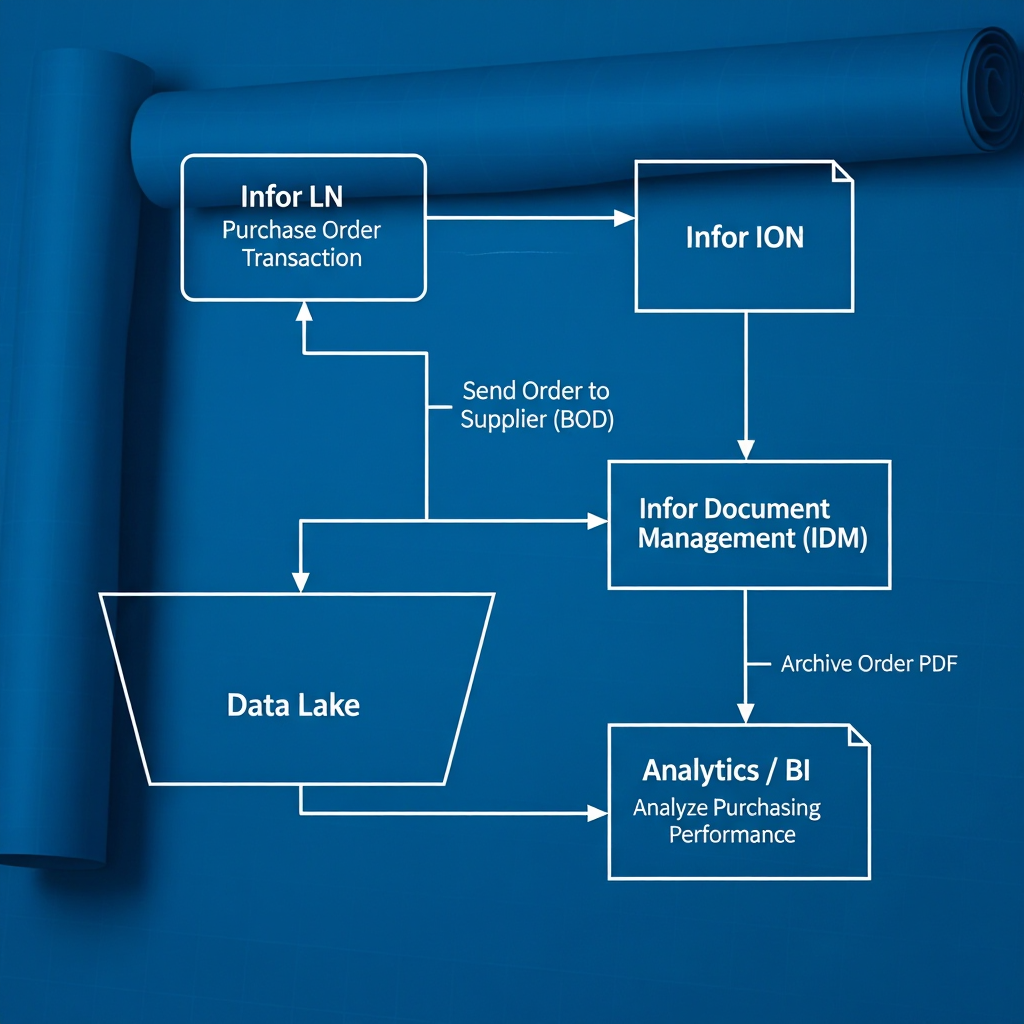The New Role of the Infor LN Consultant

For years, the value of an Infor LN ERP consultant (or Baan, for the veterans) was measured by the depth of their technical knowledge of the core system. The ability to write a 4GL script, to know key tables by heart, or to force a customization to bend the system to a client’s will was our daily business.
With the arrival of Infor LN Cloudsuite and its multi-tenant model, this paradigm has been overturned. The purely “technical” consultant, focused solely on the ERP, is becoming obsolete.
In the on-premise world, customization was the rule. However, every modification created a technical debt, making each upgrade a separate, costly, and risky project.
The cloud has changed the rules of the game. In a multi-tenant environment, some customizations are no longer feasible, ensuring stability, security, and continuous updates for everyone. This is not a limitation, but an opportunity.

The Paradigm Shift: From Customization to Connection
The focus has shifted from:
- Writing custom code to modify LN’s behavior.
- To: using standard tools and APIs to extend and integrate LN with the corporate ecosystem.
Our mission is no longer “How can I change this session?” but rather, “What is the best way to make this information flow from LN to this other application, securely and scalably?”
The New Trinity of Skills for the Modern LN Consultant
While deep functional expertise remains the bedrock of our profession, the cloud demands a broader, more strategic vision. Today’s LN consultant must evolve beyond the core application, complementing their process mastery with a strong awareness of integration architecture and data analytics. This holistic perspective is the key to designing solutions that are not only functional but also intelligent and deeply connected to the client’s entire business ecosystem.
- Deep Functional Expertise
Before exploring what’s new, we must reaffirm what is timeless. All architectural and analytical skills are built upon a deep, unshakable understanding of core business processes. Knowing the intricacies of Procure-to-Pay, Order-to-Cash, manufacturing flows, and warehouse logistics is, and will always be, the primary source of value for a functional consultant. Without this mastery, technology is merely a solution in search of a problem.
- Strategic Command of the Infor OS Ecosystem
This is where the role’s evolution becomes most visible. A functional consultant today must gain a deep, strategic understanding of the tools that form the backbone of the Cloudsuite. This doesn’t mean they need to become a technical developer. Instead, the functional expert must understand the capabilities of these tools to design the best possible solution for the business. This includes fluency in:
- Infor ION (Intelligent Open Network): The core responsibility is to design the data flows and design the business logic. The functional expert must know which BODs to leverage and how to orchestrate communication between LN and other applications, designing the “what” and the “why,” and then collaborating with the technical team on the “how.”
- Infor Document Management (IDM): The focus here is on designing integrated document lifecycles. This means architecting structured document flows for critical processes like invoice approval or quality certificate management.
- The Data-Driven Mindset (Data Lake & Analytics)
In the past, ERP data was often locked within the application. The Infor Data Lake changes this paradigm completely. For the functional consultant, this means developing a data-driven mindset. The goal is not to become a data scientist, but to act as the crucial bridge between business needs and data insights.
This involves understanding how LN tables are published, being able to formulate strategic business questions, and possessing enough SQL proficiency to perform quick analyses. Whether it’s architecting a complex BI dashboard or configuring a Dynamic Query Widget (check out this post related to it), the modern consultant must know where the data lives and how to put it to work.

A Practical Example: The Old vs. The New
Scenario: A client needs to integrate Advance Shipment Notices (ASN) received from a strategic supplier.
- The Old Approach: create a custom table in LN, develop a script to read a CSV file from an FTP server at regular intervals, and insert the data directly into LN tables, manually handling all validation logic and error management. Result: A fragile solution, difficult to maintain, and bypassing standard logic.
For more formal B2B communication, especially in sectors like Automotive, EDI was the standard. However, this process was far from the seamless integration we know today.
- The New Approach: Define a flow in ION that receives the ASN via API (or monitors an inbox). Map the supplier’s data to the LN BOD for shipments. Invoke LN’s APIs to create the warehouse receipt notice, leveraging all native validation logic. Use IDM to archive the original ASN document and link it to the transaction in LN. Analyze reception times and ASN accuracy via Widget that reads data from the Data Lake. Result: A robust, standard, scalable, and monitorable solution.
More Challenging, More Valuable
The role of the Infor LN Consultant has evolved to a strategic, all-around advisor. It demands continuous learning and a much broader vision than the ERP alone.
It is a more complex role, without a doubt. But it is also a more valuable one, positioning us at the heart of our clients’ digital transformation and making us indispensable partners in their success.
Written by Andrea Guaccio
September 10, 2025